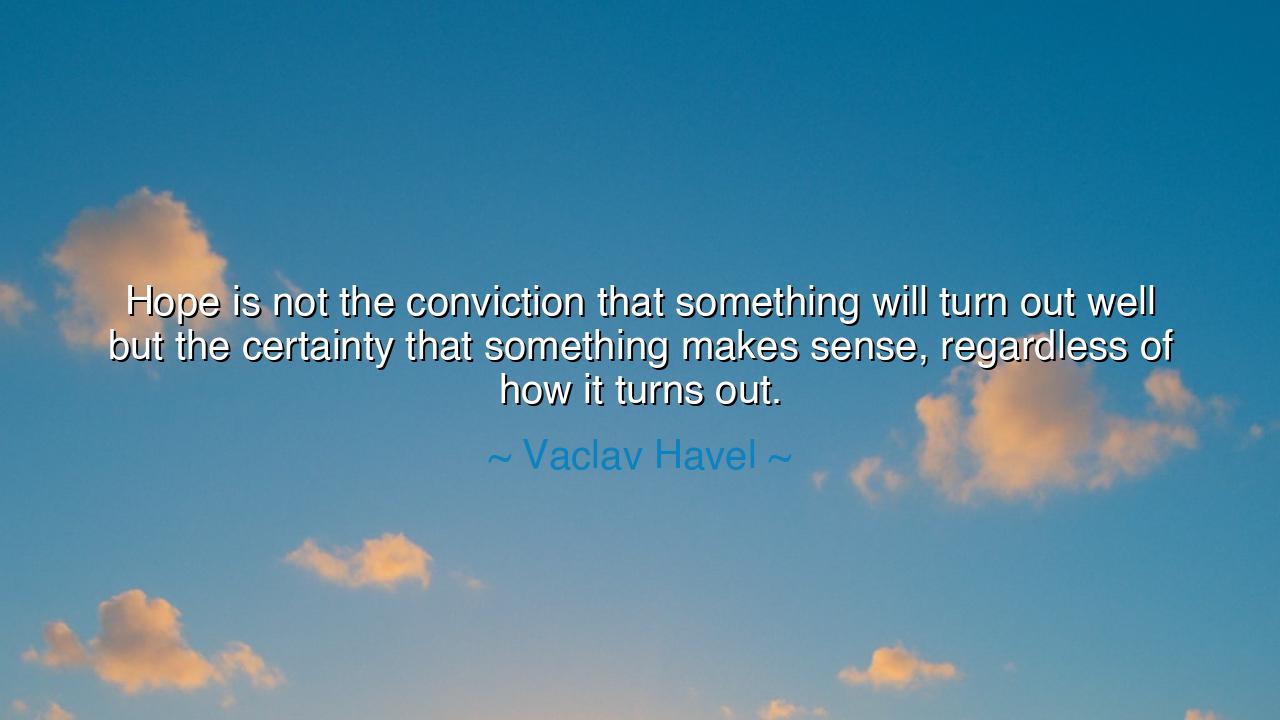
Hope is not the conviction that something will turn out well but
Hope is not the conviction that something will turn out well but the certainty that something makes sense, regardless of how it turns out.






“Hope is not the conviction that something will turn out well but the certainty that something makes sense, regardless of how it turns out.” Thus spoke Václav Havel, the poet, the prisoner, the president—a man who walked through the shadows of tyranny yet carried the light of faith within him. His words pierce to the soul of what it means to endure. For in them, hope is not painted as a wishful dream or a fragile comfort. No—it is a steadfast knowing, a flame that burns not because victory is assured, but because meaning itself is worth defending, even in the face of loss.
In the ages of the ancients, philosophers spoke of two kinds of strength: the strength of the body, which conquers through might, and the strength of the spirit, which conquers through truth. Havel’s hope belongs to the latter. It is the kind of hope that does not depend upon outcomes or fortune, but upon the knowledge that one’s actions, one’s choices, one’s very being, are aligned with a greater truth. It is the hope of the righteous heart that says, “Even if the world falls apart, it was still right to build.” Such hope is not naïve—it is heroic.
Václav Havel lived these words. In a time when his homeland was crushed under the weight of an iron regime, when truth was forbidden and speech was bound in chains, he refused to surrender to despair. He wrote plays that spoke truth through allegory, letters that carried courage through the cracks of prison walls. He did not know if his nation would ever be free, nor if his words would survive. Yet he wrote, because he knew that truth itself makes sense, even when victory is uncertain. Years later, when the Velvet Revolution rose and freedom returned to his people, the world saw what his hope had built—not the hope of optimism, but the hope of meaning.
This deeper kind of hope has always guided those who change the world. Socrates drank the hemlock with calmness, not because he believed the outcome would be well, but because he knew that living by truth was better than living in fear. Joan of Arc walked into the flames not with assurance of triumph, but with certainty that her purpose was divine. Nelson Mandela, who spent twenty-seven years behind prison walls, spoke of the same light—an inner conviction that justice, though delayed, was worth every moment of suffering. These are the echoes of Havel’s wisdom through the corridors of time: hope as faith in meaning, not faith in comfort.
Many mistake hope for optimism. They think it means believing that things will turn out well—that the storm will pass and the sun will shine. But Havel teaches a harder, nobler truth: that hope is what keeps the torch alight even when the storm does not pass. It is the courage to act rightly even when the world seems deaf to righteousness. To live with such hope is to anchor the soul not in what we can control, but in what we know to be true. It is to say, “Though I cannot see the end, I walk forward because the path itself is right.”
And this lesson, though ancient, is ever new. In our own time, when the world trembles with uncertainty, when justice feels far and goodness unrecognized, we must remember Havel’s teaching: do not place your hope in success, but in meaning. Ask not, “Will this work?” but rather, “Is this right?” For the person who acts with integrity, even in failure, plants seeds that will one day bloom beyond their sight. The future is shaped not by those who calculate outcomes, but by those who remain faithful to what is just and true.
So let this wisdom be your guide: hope is the strength to act rightly without assurance of reward. It is to love the world even when it does not love you back. It is to build when others destroy, to speak when others are silent, to believe when others despair. For as long as meaning endures, hope endures.
And when your own night falls dark, remember the voice of Havel—soft yet unyielding—whispering across time: Do not seek the promise of success. Seek the promise of purpose. For it is not the victory that sanctifies the struggle, but the truth that gives the struggle meaning.






AAdministratorAdministrator
Welcome, honored guests. Please leave a comment, we will respond soon